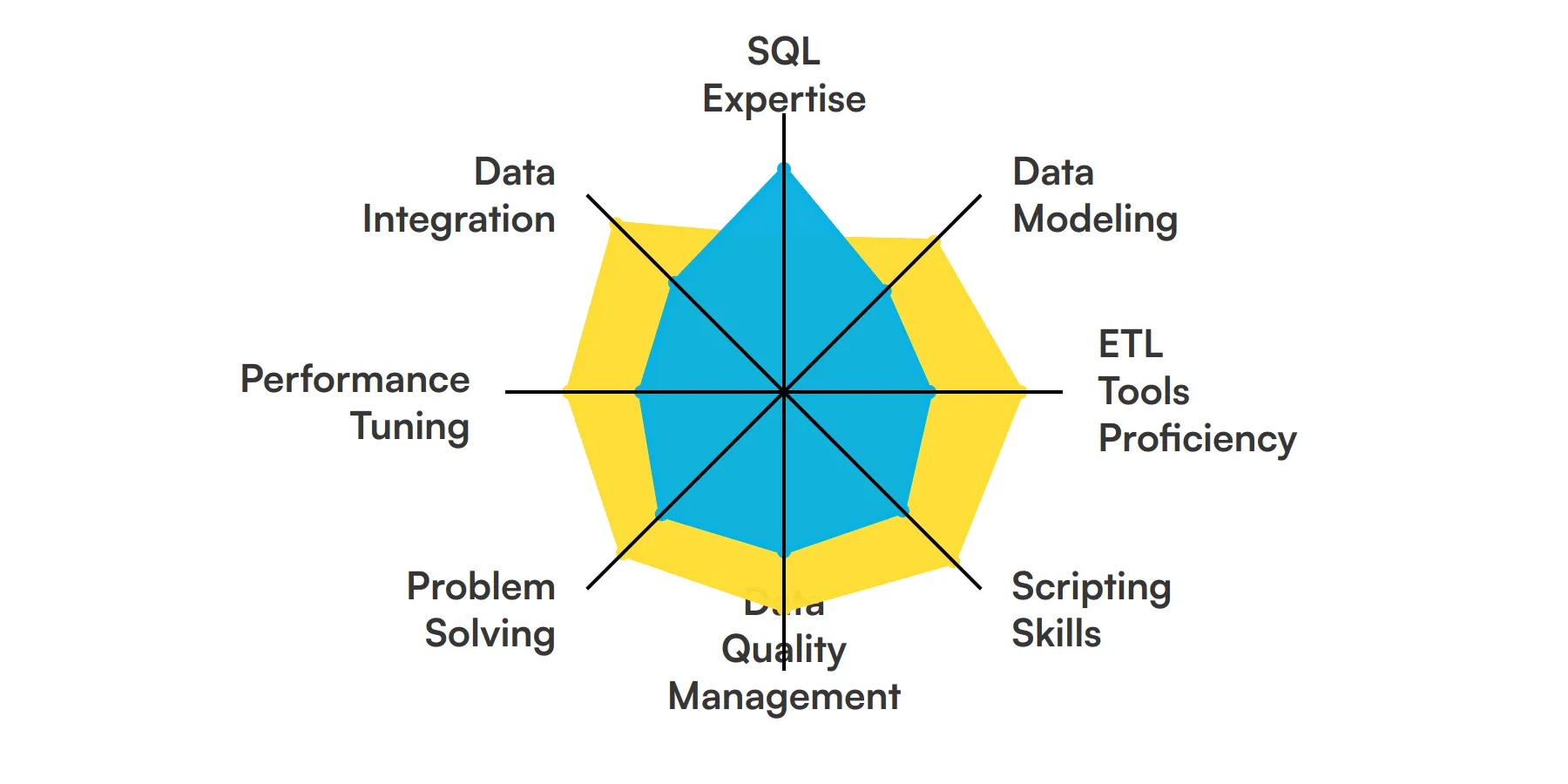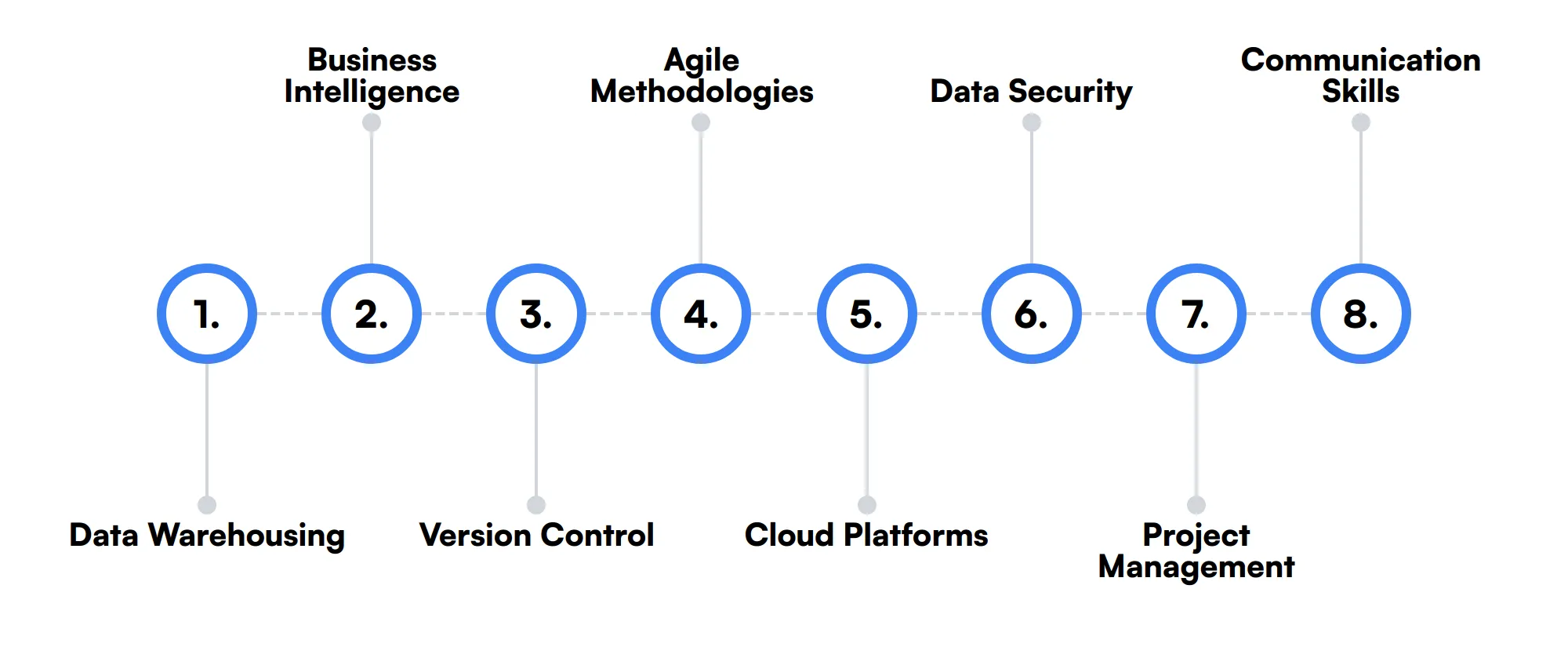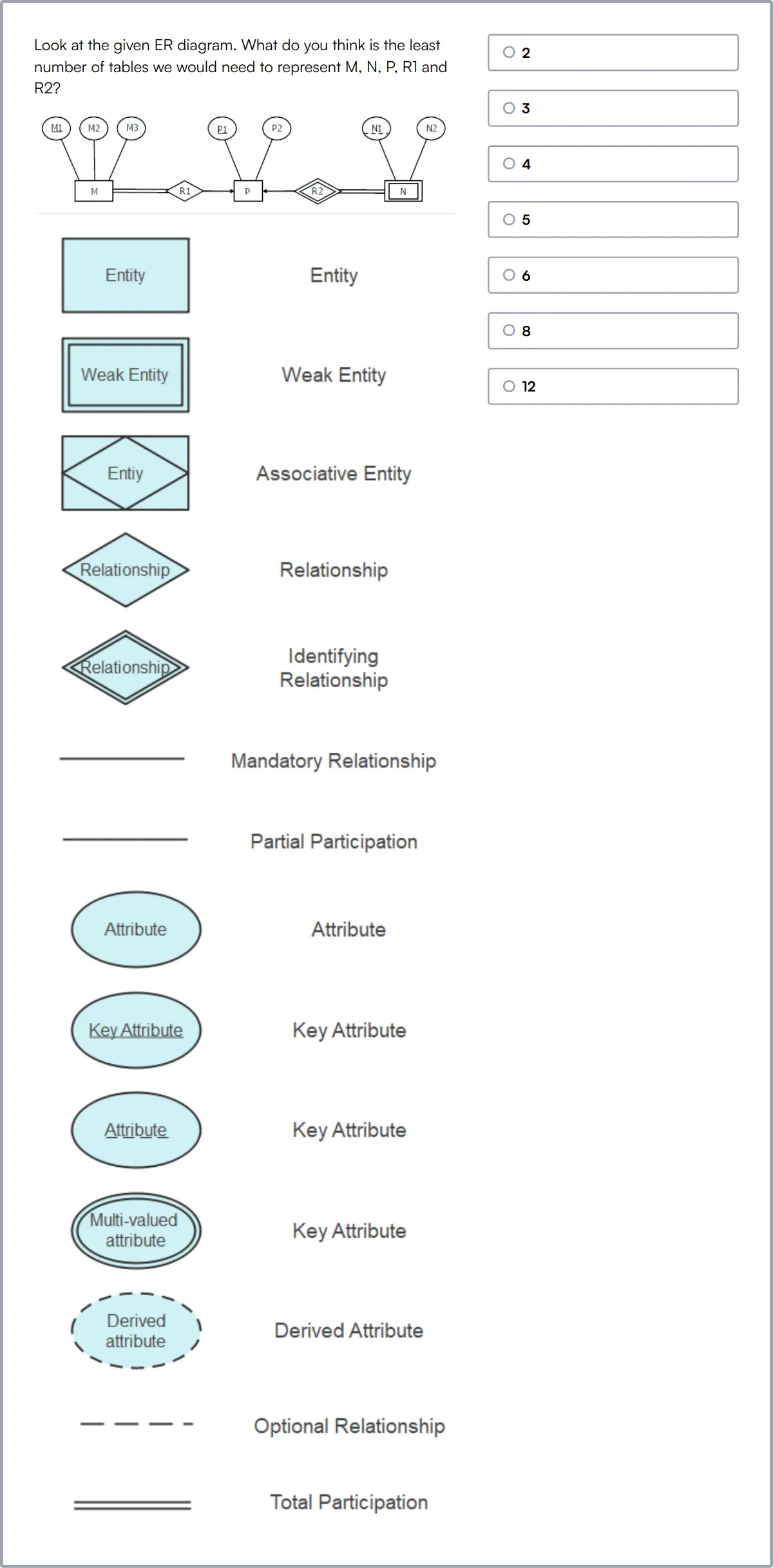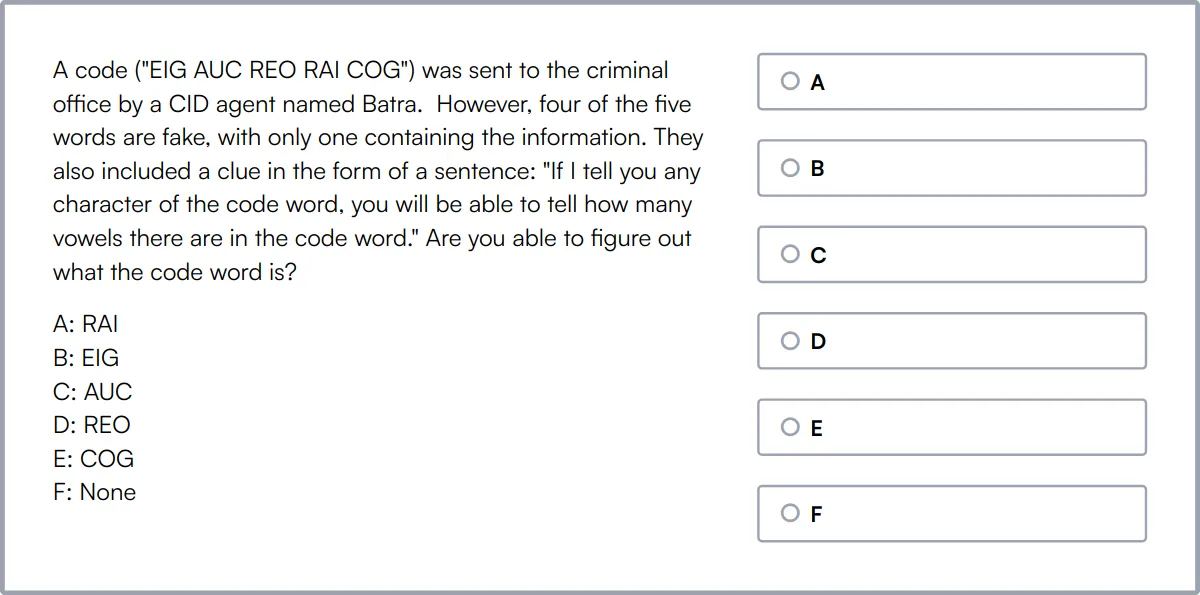ETL developers are at the heart of data-driven businesses, transforming raw data into valuable insights. They play a crucial role in data integration and workflow automation, ensuring that data is accurate and accessible for analysis and decision-making.
Skills required for an ETL developer include proficiency in database technologies, understanding of data extraction, transformation, and loading processes, and strong problem-solving abilities. Additionally, they need to be adept at scripting and automating tasks to streamline data workflows.
Candidates can write these abilities in their resumes, but you can’t verify them without on-the-job ETL Developer skill tests.
In this post, we will explore 8 essential ETL Developer skills, 8 secondary skills and how to assess them so you can make informed hiring decisions.
Table of contents
8 fundamental ETL Developer skills and traits
The best skills for ETL Developers include SQL Expertise, Data Modeling, ETL Tools Proficiency, Scripting Skills, Data Quality Management, Problem Solving, Performance Tuning and Data Integration.
Let’s dive into the details by examining the 8 essential skills of a ETL Developer.

SQL Expertise
SQL is the backbone of data manipulation and retrieval in ETL processes. An ETL developer uses SQL to query databases, transform data, and ensure that data is correctly formatted and aggregated for business analysis. Mastery of SQL helps in efficiently handling complex data transformation requirements.
For more insights, check out our guide to writing a SQL Developer Job Description.
Data Modeling
Understanding data modeling is crucial for ETL developers to structure databases optimally. This skill involves designing data warehouse schemas and defining how data interrelates, which is essential for effective data extraction, transformation, and loading processes.
ETL Tools Proficiency
ETL developers need to be proficient in various ETL tools such as Informatica, Talend, and DataStage. These tools help automate the steps involved in extracting, transforming, and loading data, making the process more streamlined and less prone to error.
Check out our guide for a comprehensive list of interview questions.
Scripting Skills
Scripting skills in languages like Python or Bash are necessary for automating repetitive tasks and manipulating data that cannot be handled through standard SQL. This skill enhances an ETL developer's ability to customize data processing and integration tasks.
Data Quality Management
Ensuring data quality is a key responsibility of an ETL developer. This involves validating and cleaning data to meet quality standards before it is loaded into the target system. High-quality data is critical for accurate analytics and business decision-making.
Problem Solving
ETL development often involves complex logical and technical challenges. Effective problem-solving skills enable ETL developers to identify issues within the data flow, devise solutions, and implement fixes to maintain the integrity of the data transformation process.
Performance Tuning
An ETL developer must optimize ETL processes to handle large volumes of data efficiently. Performance tuning involves enhancing the speed and reducing the load on the systems, ensuring that data flows smoothly and is accessible for business needs in a timely manner.
Data Integration
Data integration involves combining data from different sources into a single, unified view. ETL developers use their skills to ensure seamless integration, which is crucial for providing a holistic view of business metrics and driving strategic decisions.
For more insights, check out our guide to writing a Data Engineer Job Description.
8 secondary ETL Developer skills and traits
The best skills for ETL Developers include Data Warehousing, Business Intelligence, Version Control, Agile Methodologies, Cloud Platforms, Data Security, Project Management and Communication Skills.
Let’s dive into the details by examining the 8 secondary skills of a ETL Developer.

Data Warehousing
Knowledge of data warehousing techniques helps ETL developers understand the architectural, database, and software components involved in building a data warehouse, which is crucial for effective data storage and retrieval.
Business Intelligence
Understanding business intelligence tools and techniques is beneficial for ETL developers to align ETL processes with organizational goals and help stakeholders make informed decisions based on the data processed.
Version Control
Familiarity with version control systems like Git is important for ETL developers to manage changes in the ETL scripts and collaborate effectively with other team members on projects.
Agile Methodologies
Experience with agile methodologies can help ETL developers adapt to changing requirements and work effectively in fast-paced development environments. This approach emphasizes iterative development and continuous feedback.
Cloud Platforms
Knowledge of cloud platforms such as AWS, Azure, or Google Cloud is valuable as more organizations move their ETL processes to the cloud. This skill helps ETL developers manage and scale ETL solutions efficiently in a cloud environment.
Data Security
Understanding data security principles is important to ensure that sensitive data handled during the ETL process is protected against unauthorized access and breaches, maintaining trust and compliance.
Project Management
Basic project management skills can aid ETL developers in planning, executing, and monitoring ETL projects, ensuring they are delivered on time and within budget.
Communication Skills
Effective communication is essential for ETL developers to translate technical details into understandable terms for stakeholders and to collaborate effectively with team members who may not have a technical background.
How to assess ETL Developer skills and traits
Assessing the skills and traits of an ETL Developer can be a challenging task, given the diverse range of expertise required. From SQL expertise and data modeling to proficiency in ETL tools and scripting skills, an ETL Developer must possess a well-rounded skill set to handle complex data integration tasks effectively.
Traditional resumes and certifications may not provide a complete picture of a candidate's abilities. To truly understand their competencies, it's important to use skills-based hiring practices, such as talent assessments. These assessments can help you evaluate their problem-solving abilities, data quality management, and performance tuning skills.
For a more streamlined and accurate evaluation process, consider using Adaface on-the-job skill tests. These tests can help you achieve a 2x improved quality of hires and an 85% reduction in screening time, ensuring you find the right fit for your ETL Developer role.
Let’s look at how to assess ETL Developer skills with these 6 talent assessments.
SQL Online Test
Our SQL Online Test evaluates a candidate's ability to design and build relational databases and tables from scratch, apply CRUD options, write queries and subqueries to filter data, and create indexes for faster SQL queries.
The test assesses their understanding of creating databases, tables, and performing CRUD operations. It also covers joins, subqueries, conditional expressions, views, indexes, and transactions.
Successful candidates demonstrate proficiency in SQL syntax, database design, and query optimization. They also show knowledge of security and scalability in SQL databases.

Data Modeling Skills Test
Our Data Modeling Skills Test evaluates a candidate's knowledge and abilities in database design, SQL, ER diagrams, normalization, relational schema, data integrity, data mapping, data validation, and data transformation.
The test covers data modeling, database design, SQL, ER diagrams, normalization, relational schema, data integrity, data mapping, data validation, and data transformation.
Candidates who perform well show a strong understanding of database design principles, data integrity, and the ability to transform and validate data effectively.

Informatica Online Test
Our Informatica Online Test evaluates a candidate's ability to use PowerCenter for ETL. It assesses their ability to execute data synchronization/replication tasks, design data transformations, and manage source/target definitions.
The test covers data warehousing, ETL, data integration, relational database CRUD operations, database joins, mapplets, parameterization, workflows, sessions, tasks, and transformations.
High-scoring candidates demonstrate proficiency in using PowerCenter for complex ETL processes and show a deep understanding of data integration and transformation techniques.
Informatica Data Quality Online Test
Our Informatica Data Quality Online Test evaluates a candidate's knowledge and skills in various aspects of data quality management, including data profiling, data cleansing, data standardization, and duplicate detection.
The test covers data masking, data subset, data generation, rule simulator, sequence data generation, dictionary data generation, data quality, data profiling, data cleansing, data standardization, duplicate detection, data validation, and data enrichment.
Candidates who excel in this test show a strong understanding of data quality management practices and the ability to implement data profiling, cleansing, and standardization techniques effectively.
Problem Solving Test
Our Problem Solving Test evaluates a candidate's ability to understand instructions, analyze data, and respond to complex problems or situations. The questions provide insights into their problem-solving, learning agility, and coachability.
The test covers abstract reasoning, critical thinking, deductive reasoning, inductive reasoning, pattern matching, and spatial reasoning.
Successful candidates demonstrate strong analytical skills, the ability to think critically, and the capacity to solve complex problems efficiently.

Data Analysis Test
Our Data Analysis Test assesses a candidate's ability to handle, modify, analyze, and interpret data. The test uses scenario-based MCQ questions to screen for experience with analyzing data to find possible outcomes, detect anomalies, and extract meaningful insights.
The test covers basics of data modeling, data analysis, business analysis fundamentals, data interpretation, data queries and databases, data operations, data investigations, and popular data tools like Excel.
Candidates who perform well show proficiency in data analysis, interpretation, and the ability to use tools like Excel to visualize data and extract insights.
Summary: The 8 key ETL Developer skills and how to test for them
| ETL Developer skill | How to assess them |
|---|---|
| 1. SQL Expertise | Evaluate candidate's ability to write complex queries and optimize database interactions. |
| 2. Data Modeling | Assess understanding of conceptual, logical, and physical data models creation. |
| 3. ETL Tools Proficiency | Test proficiency with tools like Informatica, Talend, and DataStage. |
| 4. Scripting Skills | Check ability to automate tasks using Python, Bash, or PowerShell. |
| 5. Data Quality Management | Review methods for ensuring accuracy and reliability of data. |
| 6. Problem Solving | Observe how candidates approach and solve complex data-related issues. |
| 7. Performance Tuning | Gauge skills in optimizing database and ETL process performance. |
| 8. Data Integration | Examine ability to combine data from different sources seamlessly. |
ETL Assessment Test
ETL Developer skills FAQs
What are the key SQL skills an ETL Developer should have?
An ETL Developer should be proficient in writing complex SQL queries, understanding joins, subqueries, and window functions. They should also be skilled in optimizing queries for performance.
How important is data modeling in the ETL process?
Data modeling is critical as it helps in structuring the data appropriately, ensuring that the data flows efficiently through the ETL pipeline and supports the requirements of the end data usage.
What are some popular ETL tools that developers should know?
Developers should be familiar with tools like Informatica, Talend, and Microsoft SSIS. Knowledge of Apache NiFi and Azure Data Factory is also beneficial for modern data integration tasks.
How can scripting skills enhance an ETL Developer's effectiveness?
Scripting skills enable developers to automate repetitive tasks, handle data transformations, and manage ETL workflows more dynamically. Languages like Python and Bash are commonly used.
What is the role of data quality management in ETL?
Data quality management ensures the accuracy, completeness, and reliability of data. ETL Developers must implement checks and balances to maintain data integrity throughout the ETL process.
Why is knowledge of data warehousing important for an ETL Developer?
Understanding data warehousing is important for ETL Developers as it involves the consolidation of data from multiple sources into a single repository, which is optimized for analysis and querying.
How does understanding cloud platforms benefit ETL Developers?
Knowledge of cloud platforms like AWS, Azure, and Google Cloud Platform allows ETL Developers to leverage scalable resources for data processing and storage, facilitating more efficient data management.
What project management skills are necessary for an ETL Developer?
ETL Developers should be able to plan, execute, and monitor ETL projects, ensuring they meet deadlines and adhere to specifications. Familiarity with project management tools and methodologies is beneficial.

40 min skill tests.
No trick questions.
Accurate shortlisting.
We make it easy for you to find the best candidates in your pipeline with a 40 min skills test.
Try for freeRelated posts
Free resources



